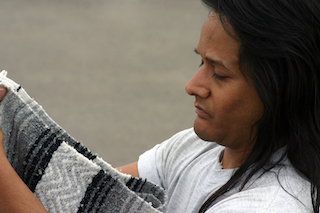 A new study published in the Canadian Medical Association Journal examined the impact of socioeconomic status on three mental health problems (physiological distress, suicidal thoughts and suicide attempt) within Indigenous peoples living off-reserve in Canada.
A new study published in the Canadian Medical Association Journal examined the impact of socioeconomic status on three mental health problems (physiological distress, suicidal thoughts and suicide attempt) within Indigenous peoples living off-reserve in Canada.
“We hoped to assess if there is a link between socioeconomic inequalities and mental health outcomes within Indigenous peoples in Canada,” study author Mohammad Hajizadeh told us. “Current studies have provided evidence on the impact of socioeconomic status on different health outcomes. Based on the current studies, we were expecting to see more mental health problems among socioeconomically disadvantaged Indigenous peoples.”
Indigenous populations around the globe have high rates of suicide and mental health issues. In Canada, suicide is a major cause of death for the First Nation, Metis, and Inuit populations. Suicide rates among Indigenous people in Canada are two to three times higher than non-Indigenous Canadians.
According to the 2012 Aboriginal Peoples Survey, people in Canada with an Aboriginal identity represent four per cent of the total Canadian population or 1,409,100 people. There are over 850,000 First Nations people, 450,000 Métis, and nearly 60,000 Inuit living in Canada.
Just under half of the number of Aboriginal people in Canada are under the age of 25 (46 per cent). Forty-three per cent of First Nations children 14 years of age and under live with both of their parents compared to 74 per cent of non-Aboriginal children. Forty-three per cent of First Nations people live on a reserve while 15 per cent live off-reserve.
The study, titled, Socioeconomic inequalities in psychological distress and suicidal behaviours among Indigenous peoples living off-reserve in Canada, was written by Hajizadeh as well as Amy Bombay and Yukiko Asada. Hajizadeh and his colleagues focused on mental health outcomes among Indigenous populations in Canada because they have the poorest mental health outcomes with high rates of suicide and psychological distress as characterized by psychological and physiologic symptoms of anxiety and depression.
To test their theory, they measured socioeconomic inequalities in psychological distress and suicidal behaviours and identified factors that explain these inequalities within Indigenous peoples living off-reserve. They did this using the 2012 Aboriginal Peoples Survey representing over 600,000 Indigenous adults over the age of 18 living off-reserve in Canada.
“We showed a high level of physiological distress and prevalence rates of lifetime suicidal thoughts (16 per cent for men vs. 22 per cent for women) and suicide attempt (two per cent for men vs. 2.3 per cent for women) among Indigenous peoples living off-reserve in Canada,” Hajizadeh told us. “Our study also suggested persistent and substantial socioeconomic-related inequalities in mental health outcomes among the four Indigenous peoples living off-reserve in Canada: Status First Nations, non-status First Nations, Métis and Inuit. We found food insecurity, income and employment status as main determinants of high rates of mental health problems within Indigenous peoples living off-reserve in Canada.”
Sadly, Indigenous people in Canada have the poorest health outcomes among Canadians. The causes are related to socioeconomic inequalities as well as ongoing experiences relating to historical colonization. Hajizadeh and his colleagues found the significant contribution of food insecurity to mental health problems among socioeconomically disadvantaged Indigenous peoples, an interesting finding of the study.
“Our study suggest that policies designed to address food insecurity, income and employment status may help reduce mental health problems faced by low socioeconomic status Indigenous peoples living off-reserve in Canada,” Hajizadeh told us.
Patricia Tomasi is a mom, maternal mental health advocate, journalist, and speaker. She writes regularly for the Huffington Post Canada, focusing primarily on maternal mental health after suffering from severe postpartum anxiety twice. You can find her Huffington Post biography here. Patricia is also a Patient Expert Advisor for the North American-based, Maternal Mental Health Research Collective and is the founder of the online peer support group - Facebook Postpartum Depression & Anxiety Support Group - with over 1500 members worldwide. Blog: www.patriciatomasiblog.wordpress.com
Email: tomasi.patricia@gmail.com